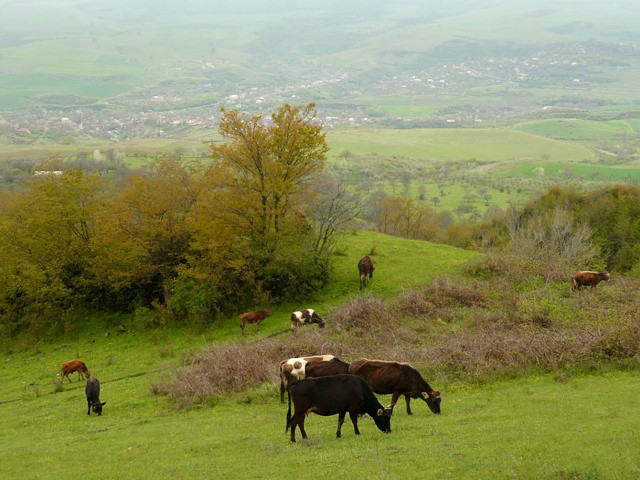Clinton In Armenia To Urge Peace Talks With Azerbaijan

U.S. Secretary of State Hillary Clinton has arrived in the Armenian capital of Yerevan amid growing tensions between Armenia and its neighbor Azerbaijan.
Clinton reportedly will seek to ease the hostile relations between the two former Soviet republics by suggesting a series of peace talks.
In Yerevan, Madame Secretary will meet with Armenia’s President Serzh Sargsyan and Foreign Minister Edward Nalbandian.
She will journey to Georgia on Tuesday, travel to Azerbaijan on Wednesday and then move on to Turkey.
Armenia and Azerbaijan fought a deadly war from 1988 to 1994, in tandem with the collapse of the Soviet Union, over the Nagorno-Karabakh region that both sides claim. At least 30,000 people died in the conflict, which ended in a tense ceasefire in 1994.
Nagorno-Karabakh, which has a majority Armenian population, remains a de facto independent state but is partly under the military control of Armenia.
Since the 1994 ceasefire, there have been periodic breaches of the ceasefire manifested by cross-border raids and shootings. In fact, Armenian media reported that on Monday three Armenian soldiers were killed by Azerbaijani troops in the Tavush province of the country.
Technically, Armenia and Azerbaijan remain at war, and the Azeris have repeatedly threatened to re-take Nagorno-Karabakh by force.
Human rights activists also want Clinton to discuss alleged abuses perpetrated by Azerbaijan upon opposition groups and dissidents.
Human Rights Watch (HRW) has repeatedly cited abuses committed by Azerbaijani police and security officials against dissidents and journalists, ahead of the much-anticipated EuroVision song contest in the capital city of Baku.
“The Azerbaijan government doesn’t respect its own citizens’ freedom of speech,” HRW stated.
“Journalists are routinely harassed and intimidated, and critical journalists can be locked up under the country’s strict libel laws. Others have been victims of bogus criminal charges, like drug possession, and imprisoned. The government has banned all foreign radio stations on FM frequencies, including BBC and Radio Free Europe.”
Azerbaijan, whose population is overwhelmingly Shia Muslim, nonetheless has tense relations with Iran. However, as an oil-rich nation, the Azeris have received much foreign investor interest.
© Copyright IBTimes 2024. All rights reserved.




















